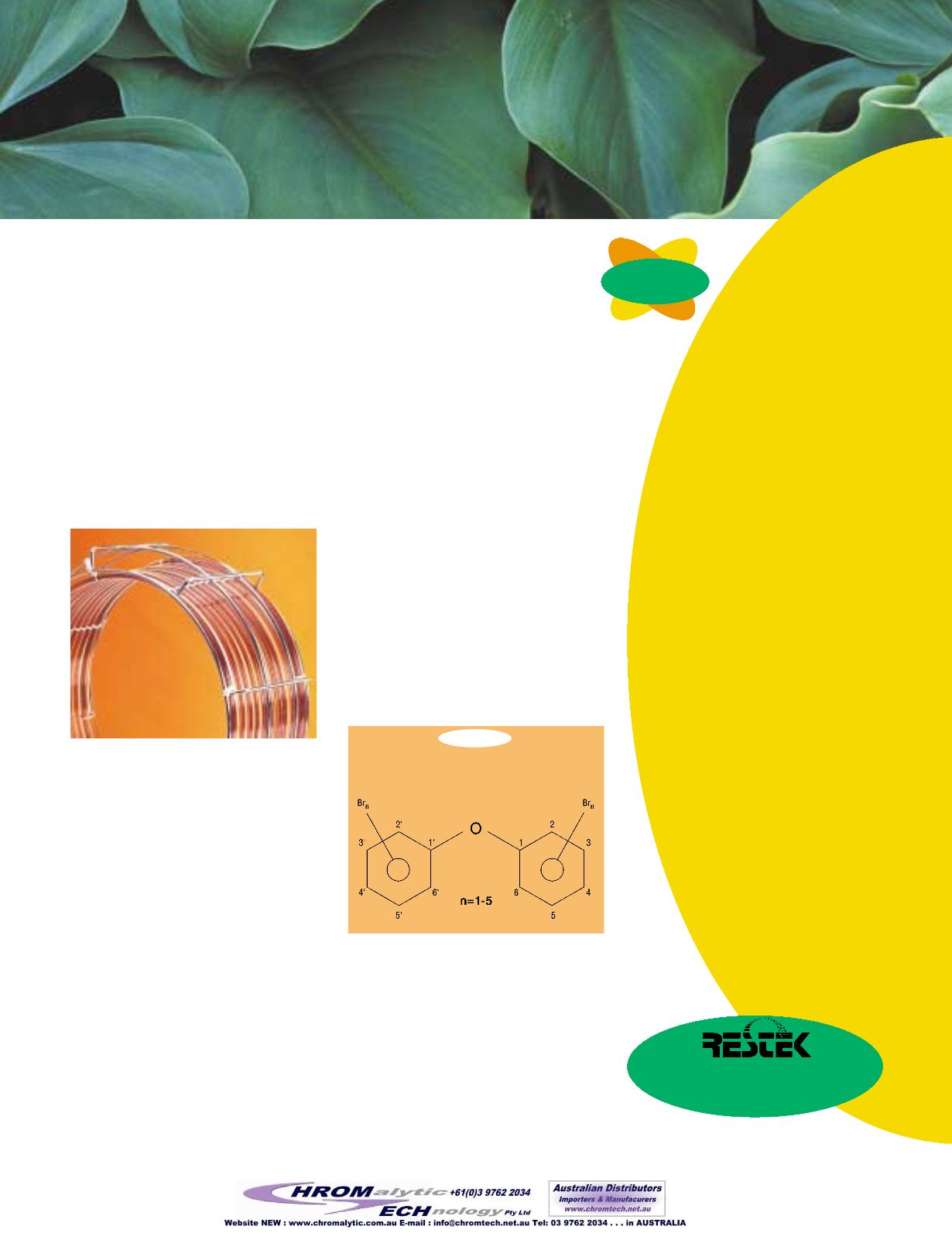

Innovators of High Resolution
Chromatography Products
the
in this issue
Rt-Msieve
™
5A & MXT
®
-5A
PLOT Columns
…pg. 5
HPLC Analysis of
Narcotic/Acetaminophen Mixtures
…pg. 6–7
More Reliable Results from
Semivolatiles Analysis
…pg. 8–9
New Analytical Reference Materials
…pg. 9
Scotty
®
Transportables
…pg. 10
Order ChemService Pesticides from
Restek
…pg. 11
Polar Analytes by HPLC/
Replacement Instrument Parts
…pg. 12–13
Super-Clean
™
Gas-Trapping
System for LC/MS
…pg. 14
New Reference Books
…pg. 14
Cool Tools
…pg. 15
Behind the Scenes
…pg. 16
800-356-1688
814-353-1300
www.restekcorp.com2002
vol. 3
by Frank Dorman, Ph.D., Innovations Team, Director of Technical Development
Optimized Analysis of
Brominated Flame Retardants
Using an Rtx
®
-500 GC Capillary Column
Advantage
Rtx
®
-500 GC
Capillary Column
…pg. 1–2
Vespel
®
Ring Inlet Seal
…pg. 3
Leak Detective
™
II
Electronic Leak Detector
…pg. 3
Bringing Packed Column
Technology Back to Life
…pg. 4
✔
Elutes decabromodiphenyl ether in 30 minutes.
✔
Low bleed for sensitive ECD and MS analyses.
✔
Separates other higher molecular weight compounds.
new
Brominated flame retardants are an emerging envi-
ronmental concern that present a unique challenge
to analysts. One of the most heavily used types of
brominated flame retardants are the polybrominat-
ed diphenyl ethers (PBDEs). These compounds
have the structure shown in Figure 1, with 1 to 10
bromines substituted on the two rings. This makes
these compounds fairly heavy (up to approximately
1000amu), thus placing difficult requirements on
the gas chromatographic (GC) analytical system.
While the analysis may be performed using either
electron capture detection (ECD) or mass spectro-
metric detection (MS), the compounds require a
high oven temperature to elute in a reasonable
amount of time. This requires an analytical GC col-
umn featuring high-temperature fused silica or
metal tubing and a high-temperature stationary
phase that has both low bleed and the selectivity
necessary to separate the PBDE congeners.
Restek chemists, working in conjunction with Karen
MacPherson and Eric Reiner at the Ontario Ministry
of the Environment, have developed a new fused sil-
ica capillary GC column and analytical procedure
for separating PBDE congeners in a reasonable
time. The new Rtx
®
-500 column incorporates a
carborane-stabilized polydimethylsiloxane polymer
in special high-temperature fused silica tubing. The
column can be heated to 380°C, and exhibits very
low bleed at this extreme temperature. The column
combines the stability required for separating high-
er molecular weight compounds with the sensitivity
required for ECD or MS analysis.
PBDE congeners up to decabromodiphenyl ether
(PBDE 209) are separated in less than 45 minutes
Figure 1
PBDEs can have high molecular weight, due
to bromine substitution around the two rings.
using the new Rtx
®
-500 column in a GC-high resolu-
tion MS analysis (Figure 2). In a GC-ECD analysis of
the same PBDE congeners, decabromodiphenyl
ether is eluted in 30 minutes. This same system has
been used for baseline separation of toxic PCB con-
geners and is currently under investigation for analy-
ses of the brominated and chlorinated dioxins and
furans. If you must analyze PBDEs or other high
molecular weight compounds, we highly recommend
the Rtx
®
-500 column for fast separations and reli-
able quantitation.
(contd. on page 2)


















